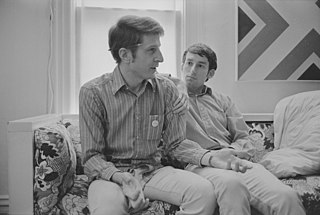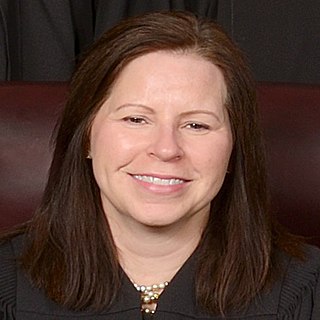
The Defense of Marriage Act (DOMA) was a United States federal law passed by the 104th United States Congress and signed into law by President Bill Clinton on September 21, 1996. It banned federal recognition of same-sex marriage by limiting the definition of marriage to the union of one man and one woman, and it further allowed states to refuse to recognize same-sex marriages granted under the laws of other states.
An amicus curiae is an individual or organization that is not a party to a legal case, but that is permitted to assist a court by offering information, expertise, or insight that has a bearing on the issues in the case. Whether an amicus brief will be considered is typically under the court's discretion. The phrase is legal Latin and the origin of the term has been dated to 1605–1615. The scope of amici curiae is generally found in the cases where broad public interests are involved and concerns regarding civil rights are in question.

The availability of legally recognized same-sex marriage in the United States expanded from one state (Massachusetts) in 2004 to all fifty states in 2015 through various court rulings, state legislation, and direct popular votes. States each have separate marriage laws, which must adhere to rulings by the Supreme Court of the United States that recognize marriage as a fundamental right guaranteed by both the Due Process Clause and the Equal Protection Clause of the Fourteenth Amendment to the United States Constitution, as first established in the 1967 landmark civil rights case of Loving v. Virginia.
According to the United States Government Accountability Office (GAO), there are 1,138 statutory provisions in which marital status is a factor in determining benefits, rights, and privileges. These rights were a key issue in the debate over federal recognition of same-sex marriage. Under the 1996 Defense of Marriage Act (DOMA), the federal government was prohibited from recognizing same-sex couples who were lawfully married under the laws of their state. The conflict between this definition and the Due Process Clause of the Fifth Amendment to the Constitution led the U.S. Supreme Court to rule DOMA unconstitutional on June 26, 2013, in the case of United States v. Windsor. DOMA was finally repealed and replaced by the Respect for Marriage Act on December 13, 2022, which retains the same statutory provisions as DOMA and extends them to interracial and same-sex married couples.

The United States Court of Appeals for Veterans Claims is a federal court of record that was established under Article I of the United States Constitution, and is thus referred to as an Article I tribunal (court). The court has exclusive national jurisdiction to provide independent federal judicial oversight and review of final decisions of the Board of Veterans' Appeals.

The Stolen Valor Act of 2005, signed into law by President George W. Bush on December 20, 2006, was a U.S. law that broadened the provisions of previous U.S. law addressing the unauthorized wear, manufacture, or sale of any military decorations and medals. The law made it a federal misdemeanor to falsely represent oneself as having received any U.S. military decoration or medal. If convicted, defendants might have been imprisoned for up to six months, unless the decoration lied about is the Medal of Honor, in which case imprisonment could have been up to one year. In United States v. Alvarez (2012), the Supreme Court of the United States ruled that the Stolen Valor Act of 2005 was an unconstitutional abridgment of the freedom of speech under the First Amendment–striking down the law in a 6 to 3 decision.

Commonwealth of Massachusetts v. United States Department of Health and Human Services 682 F.3d 1 is a United States Court of Appeals for the First Circuit decision that affirmed the judgment of the District Court for the District of Massachusetts in a lawsuit challenging the constitutionality of section 3 of the Defense of Marriage Act (DOMA), the section that defines the terms "marriage" as "a legal union between one man and one woman as husband and wife" and "spouse" as "a person of the opposite sex who is a husband or a wife." Both courts found DOMA to be unconstitutional, though for different reasons. The trial court held that DOMA violates the Tenth Amendment and Spending Clause. In a companion case, Gill v. Office of Personnel Management, the same judge held that DOMA violates the Equal Protection Clause. On May 31, 2012, the First Circuit held the act violates the Equal Protection Clause, while federalism concerns affect the equal protection analysis, DOMA does not violate the Spending Clause or Tenth Amendment.

The Respect for Marriage Act is a landmark United States federal law passed by the 117th United States Congress in 2022 and signed into law by President Joe Biden. It repeals the Defense of Marriage Act (DOMA), requires the U.S. federal government and all U.S. states and territories to recognize the validity of same-sex and interracial civil marriages in the United States, and protects religious liberty. Its first version in 2009 was supported by former Republican U.S. Representative Bob Barr, the original sponsor of DOMA, and former President Bill Clinton, who signed DOMA in 1996. Iterations of the proposal were put forth in the 111th, 112th, 113th, 114th, and 117th Congresses.
The United States military formerly excluded gay men, bisexuals, and lesbians from service. In 1993, the United States Congress passed, and President Bill Clinton signed, a law instituting the policy commonly referred to as "Don't ask, don't tell" (DADT), which allowed gay, lesbian, and bisexual people to serve as long as they did not reveal their sexual orientation. Although there were isolated instances in which service personnel were met with limited success through lawsuits, efforts to end the ban on openly gay, lesbian, and bisexual people serving either legislatively or through the courts initially proved unsuccessful.

Mary Jeannette Schoelen is a senior judge of the United States Court of Appeals for Veterans Claims.
Mary L. Bonauto is an American lawyer and civil rights advocate who has worked to eradicate discrimination based on sexual orientation and gender identity, and has been referred to by US Representative Barney Frank as "our Thurgood Marshall." She began working with the Massachusetts-based Gay & Lesbian Advocates & Defenders, now named GLBTQ Legal Advocates & Defenders (GLAD) organization in 1990. A resident of Portland, Maine, Bonauto was one of the leaders who both worked with the Maine legislature to pass a same-sex marriage law and to defend it at the ballot in a narrow loss during the 2009 election campaign. These efforts were successful when, in the 2012 election, Maine voters approved the measure, making it the first state to allow same-sex marriage licenses via ballot vote. Bonauto is best known for being lead counsel in the case Goodridge v. Department of Public Health which made Massachusetts the first state in which same-sex couples could marry in 2004. She is also responsible for leading the first strategic challenges to section three of the Defense of Marriage Act (DOMA).

Gill et al. v. Office of Personnel Management, 682 F.3d 1 is a United States Court of Appeals for the First Circuit decision that affirmed the judgment of the District Court for the District of Massachusetts in a lawsuit challenging the constitutionality of section 3 of the Defense of Marriage Act (DOMA), the section that defines the term "marriage" as "a legal union between one man and one woman as husband and wife" and "spouse" as "a person of the opposite sex who is a husband or a wife."

OutServe-SLDN was a network of LGBTQ military personnel, formed as a result of the merger between OutServe and the Servicemembers Legal Defense Network. OutServe-SLDN was one of the largest LGBT employee resource groups in the world. OutServe was founded by a 2009 graduate of the US Air Force Academy, Josh Seefried and Ty Walrod. There were over 7,000 members and 80 chapters worldwide.
Pedersen v. Office of Personnel Management is a federal lawsuit challenging the constitutionality of the Defense of Marriage Act, Section 3, which defined the federal definition of marriage to be a union of a man and a woman, entirely excluding legally married same-sex couples. The District Court that originally heard the case ruled Section 3 unconstitutional. On June 26, 2013, the Supreme Court of the United States ruled Section 3 of DOMA unconstitutional, and denied appeal of Pedersen the next day.
United States v. Windsor, 570 U.S. 744 (2013), is a landmark United States Supreme Court civil rights case concerning same-sex marriage. The Court held that Section 3 of the Defense of Marriage Act (DOMA), which denied federal recognition of same-sex marriages, was a violation of the Due Process Clause of the Fifth Amendment.
The Bipartisan Legal Advisory Group (BLAG) has been a standing body of the U.S. House of Representatives since 1993 that directs the activities of the House Office of General Counsel. BLAG can direct the General Counsel to participate in litigation or file an amicus curiae brief in cases involving the interests of the House or BLAG can call for legislation or a House resolution authorizing the General Counsel to represent the House itself. BLAG comprises five members of House leadership:

Golinski v. Office of Personnel Management, 824 F. Supp. 2d 968, was a lawsuit filed in the United States District Court for the Northern District of California. The plaintiff, Karen Golinski, challenged the constitutionality of section 3 of the Defense of Marriage Act (DOMA), which defined, for the purposes of federal law, marriage as being between one man and one woman, and spouse as a husband or wife of the opposite sex.
The United States policy regarding same-sex immigration denied couples in same-sex relationships the same rights and privileges afforded different-sex couples based on several court decisions and the Defense of Marriage Act (DOMA) until the U.S. Supreme Court ruled Section 3 of DOMA unconstitutional in United States v. Windsor on June 26, 2013.
The Board of Veterans' Appeals (BVA) is an administrative tribunal within the United States Department of Veterans Affairs (VA), located in Washington, D.C. Established by Executive Order on July 28, 1933, the Board reviews and makes decisions on appeals concerning veterans' benefits. Its mission is to conduct hearings and issue decisions promptly, ensuring all relevant evidence and applicable laws and regulations are considered to provide fair outcomes for veterans, their dependents, and survivors. The Board operates on behalf of the Secretary of Veterans Affairs.

Margaret Bartley is an American lawyer and judge from Maryland. She is an active judge on the United States Court of Appeals for Veterans Claims.








